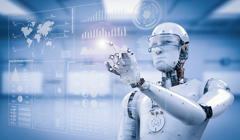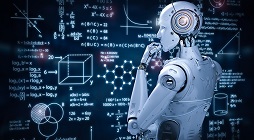Keep Up with Technology
292 Video
duration: 20 Hour and 0 Minute
Video: Robots will soon replace judges - will they enhance justice or threaten it
00:00:44
Video prices: 5 SAR weekly
Imagine a trial where the judges are replaced by robots! It's not just science fiction at all, this is actually happening in Europe right now. Although artificial intelligence has invaded many future technology sectors, its use has recently expanded to reach traditional sectors. With the continuous development of this technology, especially in terms of decision-making, artificial intelligence has become the focus of attention of courts and judicial bodies and has begun to raise many questions about whether it is qualified to arbitrate between litigants, and about the extent of its ability to respect basic rights, protect data, and provide a fair trial. That is why the European Council issued the first charter for the use of artificial intelligence in the judicial field. Amidst great fear of the dangers of falling into the pitfall of arbitrary and unfair rulings. “Artificial intelligence can be used to detect how dangerous a person is,” says Clementina Barbaro, head of the Judicial Reform Unit at the Council of Europe. “By analyzing a series of decisions and data it will be able to tell you whether a person poses a low or moderate risk or is more likely to commit an offense again. The score is used to determine the length of imprisonment.” According to Clementina and other experts, artificial intelligence may enhance discrimination and profiling, as it takes into account many factors such as personal status, level of education, professional history, income level and housing. A recent study conducted by the University of London showed that computers are able to predict more than 500 decisions of the European Supreme Court, with arbitration accuracy reaching 79 percent. This prompted Dori Rilling, a retired judge and expert in information technology and judicial reform, to ask about the legitimacy of electronic judiciary in light of such a ratio. “Once people start using AI for judicial arbitration, they will expect the results to actually predict what the justices will rule,” Dorey says. “And if the justices don’t rule in accordance with those expectations, it raises questions about the court’s legitimacy.” While this technology is still being tested in Europe, artificial lawyers (human rights robots) have already begun working in the United States of America and are truly involved in the judicial system. For more on Euronews: "Artificial Intelligence" threatens to deprive 30 million American workers of their jobs An international report reveals...human employment is threatened with extinction Watch: Robots to serve visitors at a hotel affiliated with the Chinese company “Alibaba”.
display videos continuously:
-

Best Antivirus Software: Free and Paid Options Reviewed! (Hackers Hate These)
01:18
Video prices: 5 SAR weekly
-

Video: Unboxing the Realme 13+ phone
00:18
Video prices: 5 SAR weekly
-

Video: Unboxing the vivo V40 Pro phone
00:48
Video prices: 5 SAR weekly
-

Hearing aids - the new AirPods, their features and price
00:46
Video prices: 5 SAR weekly
-

Unboxing video of the economical phone Vivo T3 Lite
00:44
Video prices: 5 SAR weekly
-

Unboxing video of the Ulefone Tab A11 Pro tablet
01:06
Video prices: 5 SAR weekly
-

Redmi Pad Pro tablet unboxing video
00:59
Video prices: 5 SAR weekly
-

Xiaomi Poco Pad tablet unboxing video
00:59
Video prices: 5 SAR weekly
-

OnePlus Pad Pro tablet unboxing video
01:16
Video prices: 5 SAR weekly
-

For the health of users - amazing features of the Samsung Galaxy Watch 7
00:55
Video prices: 5 SAR weekly
-

Samsung launches its Galaxy Ring - find out its price and features
01:31
Video prices: 5 SAR weekly
-

Samsung launches its Galaxy Z Fold 6 phone - find out its specifications
04:46
Video prices: 5 SAR weekly
-

Unboxing video of the Magic Keyboard for iPad
00:20
Video prices: 5 SAR weekly
-

Video of opening the economical phone box vivo T3x
00:18
Video prices: 5 SAR weekly
-

Video of opening the ZTE nubia Flip 5G foldable phone box
00:20
Video prices: 5 SAR weekly
-

Unitree G1: روبوت مرن قابل للطي يشبه الإنسان
01:44
Video prices: 5 SAR weekly
-

Samsung launches the Galaxy S24 series supported by artificial intelligence technologies
03:13
Video prices: 5 SAR weekly
-

Simple steps to prevent your phone from being hacked and protect your data
03:24
Video prices: 5 SAR weekly
-

12 Coolest Gadgets You Can Buy On Amazon Right Now
07:30
Video prices: 5 SAR weekly
-

Top 13 Futuristic Gadgets You Need
07:25
Video prices: 5 SAR weekly
-

The 12 Gadgets That Will Change Your Life!
07:16
Video prices: 5 SAR weekly
-

18 Gadgets for Science Lovers!
08:02
Video prices: 5 SAR weekly
-

13 AMAZON ITEMS YOU CAN BUY RIGHT NOW
07:05
Video prices: 5 SAR weekly
-

Top 12 Coolest Bike Gadgets
08:08
Video prices: 5 SAR weekly
-

Amazing Workspace Gadgets that You Need!
08:12
Video prices: 5 SAR weekly
-

15 Coolest Gadgets That Are Worth Buying
08:27
Video prices: 5 SAR weekly
-

BEST CAMPING GEAR & GADGETS 2024!!!
08:58
Video prices: 5 SAR weekly
-

Top 12 NEW COOLEST GADGETS YOU MUST SEE!
08:06
Video prices: 5 SAR weekly
-

Top 15 coolest gadgets you can buy online
07:01
Video prices: 5 SAR weekly
-

Top 13 Coolest Smart Home Gadgets
07:40
Video prices: 5 SAR weekly
-

Everyday Carry Gadgets on the Next Level
13:24
Video prices: 5 SAR weekly
-

Coolest Gadgets to TRANSFORM Your Life
08:00
Video prices: 5 SAR weekly
-

13 SURVIVAL TOOLS EVERY MAN SHOULD HAVE
07:37
Video prices: 5 SAR weekly
-

10 Coolest Gadgets 2024 That You Will Want To Buy
08:04
Video prices: 5 SAR weekly
-

THE MOST VIRAL TIK TOK GADGETS #tiktok #gadgets #coolgadgets #amazon
08:44
Video prices: 5 SAR weekly
-

20 COOLEST GADGETS YOU CAN ACTUALLY BUY #gadgets #coolgadgets #tech
11:11
Video prices: 5 SAR weekly
-

15 NEW PROHIBITED GADGETS YOU CAN BUY ON AMAZON IN 2023
11:27
Video prices: 5 SAR weekly
-

15 PROHIBITED GADGETS YOU STILL CAN BUY ON AMAZON
08:40
Video prices: 5 SAR weekly
-

19 GADGETS THAT WILL SOON BE BANNED
08:44
Video prices: 5 SAR weekly
-

12 Amazon Gadgets That Are At Another Level
12:49
Video prices: 5 SAR weekly
-

12 KINETIC Gadgets That Will BLOW Your Mind
13:19
Video prices: 5 SAR weekly
-

Coolest Gadgets For your Smart Phone #gadgets #coolgadgets #smartphone
08:34
Video prices: 5 SAR weekly
-

AMAZING HOME GADGETS ON AMAZON YOU MUST BUY
13:40
Video prices: 5 SAR weekly
-

SHOCKING Foods BANNED Around the Globe - BUT NOT IN AMERICA! #banned #food
07:35
Video prices: 5 SAR weekly
-

16 Coolest Gadgets You Want In Your Life #gadgets
07:55
Video prices: 5 SAR weekly
-

Incredible Inventions You've Never Seen UPDATED 2023 #gadgets #coolgadgets #new #tech
07:54
Video prices: 5 SAR weekly
-

13 SURVIVAL TOOLS EVERY MAN YOU CAN STILL BUY ON AMAZON
13:52
Video prices: 5 SAR weekly
-

14 COOLEST AMAZON and ALIEXPRESS GADGETS YOU NEVER KNEW EXISTED #coolgadgets #gadgets
10:35
Video prices: 5 SAR weekly
-

25 Coolest Gadgets You Should Buy! #gadgets #amazonfinds #amazongadgets #coolgadgets
08:49
Video prices: 5 SAR weekly
-

Top 10 INCREDIBLE AliExpress Gadgets that are worth the wait! #aliexpress #gadgets #coolgadgets
07:32
Video prices: 5 SAR weekly
-

12 Coolest Gadgets on Amazon you can Buy Right now #gadgets #coolgadgets #amazon #tech
10:23
Video prices: 5 SAR weekly
-

25 Coolest Gadgets Every Man Will Appreciate
08:23
Video prices: 5 SAR weekly
-

15 Must-Have Everyday Gadgets You Can't Unsee! #edc #gadgets
07:21
Video prices: 5 SAR weekly
-

FUTURE TECH New future warrior UNVEILED #military #gadgets
09:13
Video prices: 5 SAR weekly
-

12 New Prohibited Gadgets You Can Buy On Amazon
11:12
Video prices: 5 SAR weekly
-

Banned Technology around the World | Tech That Got the Big "NOPE"!
08:30
Video prices: 5 SAR weekly
-

PC Accessories That Are On Another Level
08:41
Video prices: 5 SAR weekly
-

13 Prohibited Gadgets You Can Still Buy
08:56
Video prices: 5 SAR weekly
-

12 Awesome Gadgets for Your Car #caraccessories #car #gadgets #coolgadgets
08:08
Video prices: 5 SAR weekly
-

DON'T GET CAUGHT WITH THESE! Banned Gadgets You Didn’t Know About
08:01
Video prices: 5 SAR weekly
-

Coolest Smart Gadgets You Can Buy Right Now #gadgets #coolgadgets
07:10
Video prices: 5 SAR weekly
-

17 Awesome and Useful Gadgets That You Will Love #gadgets #coolgadgets
10:25
Video prices: 5 SAR weekly
-

16 Must-Have Workspace Gadgets
08:24
Video prices: 5 SAR weekly
-

12 Most Dangerous Hacking Gadgets
11:29
Video prices: 5 SAR weekly
-

15 COOLEST CONSTRUCTION GADGETS YOU DIDN'T KNOW ABOUT
08:36
Video prices: 5 SAR weekly
-

ILLEGAL Car Gadgets You Can Still Buy!
07:19
Video prices: 5 SAR weekly
-

16 Must-Have Security Gadgets You Need #edc #coolgadgets #gadgets #selfdefense
08:14
Video prices: 5 SAR weekly
-

19 Inventions that will Save your Life! #lifesavinghacks #gadgets #survival
08:21
Video prices: 5 SAR weekly
-

10 Hacked Gadgets That Will BLOW YOUR MIND #mindblowing #hacker #gadgets #coolgadgets
09:03
Video prices: 5 SAR weekly
-

10 BANNED GADGETS THAT ARE SUPER USEFUL #gadgets #coolgadgets #banned
06:44
Video prices: 5 SAR weekly
-

10 ILLEGAL GADGETS YOU CAN BUY!
09:01
Video prices: 5 SAR weekly
-

The Caziest Flaying Machines You Have Never Seen Before!!
08:30
Video prices: 5 SAR weekly
-

12 Coolest Cheap Gadgets You Will Love | YOU HAVE TO SEE THIS #cheap #gadgets
08:12
Video prices: 5 SAR weekly
-

11 Most Dangerous Hacking Gadgets in 2023 #hacker #gadgets
10:00
Video prices: 5 SAR weekly
-

COOLEST CARS You Can Buy Right Now #car #newcars #caraccessories
12:19
Video prices: 5 SAR weekly
-

COOLEST GADGETS FOR MEN 2023 YOU'LL NEVER GUESS WHAT'S NEW! #gadgets
07:50
Video prices: 5 SAR weekly
-

Does AI Deserve the Same Rights as Humans You'll Be SHOCKED by the Answer!
08:14
Video prices: 5 SAR weekly
-

Unbelievable: 8 Secret Gadgets Cops Don't Want You to Know About!
09:35
Video prices: 5 SAR weekly
-

10 Survival Gadgets For You!
08:23
Video prices: 5 SAR weekly
-

Mind Blowing Wearable Gadgets
11:17
Video prices: 5 SAR weekly
-

10 Banned Gadgets You can Buy!
08:20
Video prices: 5 SAR weekly
-

15 Coolest Gadgets You Should Buy from Amazon and Online!
08:27
Video prices: 5 SAR weekly
-

19 Gadgets that should be banned
13:15
Video prices: 5 SAR weekly
-

Hacking Gadgets You Can Buy on Amazon!
09:45
Video prices: 5 SAR weekly
-

18 Coolest Amazon Gadgets You Can Buy
11:46
Video prices: 5 SAR weekly
-

10 Gadgets For Your Gaming Room #gadgets #gaming #coolgadgets #gamer
08:16
Video prices: 5 SAR weekly
-

Travel Essentials | Amazon Gadgets You Must Have #gadgets #travel #coolgadgets
08:52
Video prices: 5 SAR weekly
-

Backpacking Gadgets that are on the NEXT LEVEL
13:14
Video prices: 5 SAR weekly
-

Geeky Gadgets for Gamers and Gamers at Heart
09:49
Video prices: 5 SAR weekly
-

SPY GADGETS THAT WILL SURPRISE YOU
08:22
Video prices: 5 SAR weekly
-

Spy Gadgets You Should Buy!
07:33
Video prices: 5 SAR weekly
-

7 Coolest Gadgets For Men From Amazon and Online!
07:56
Video prices: 5 SAR weekly
-

Top 10 Gadgets on Amazon
07:50
Video prices: 5 SAR weekly
-

15 Banned Spy Gadgets For Students!
08:23
Video prices: 5 SAR weekly
-

19 Coolest Gadgets You Can Buy On Amazon And Online
14:49
Video prices: 5 SAR weekly
-

25 Coolest Amazon Gadgets You Should Buy!
10:47
Video prices: 5 SAR weekly
-

Forbidden Kitchen Gadgets
08:04
Video prices: 5 SAR weekly
-

Amazing Gadgets for Travel You need to Know!
08:26
Video prices: 5 SAR weekly
-

What is Instagram
01:02
Video prices: 5 SAR weekly
-

Prediction with AI
00:58
Video prices: 5 SAR weekly



